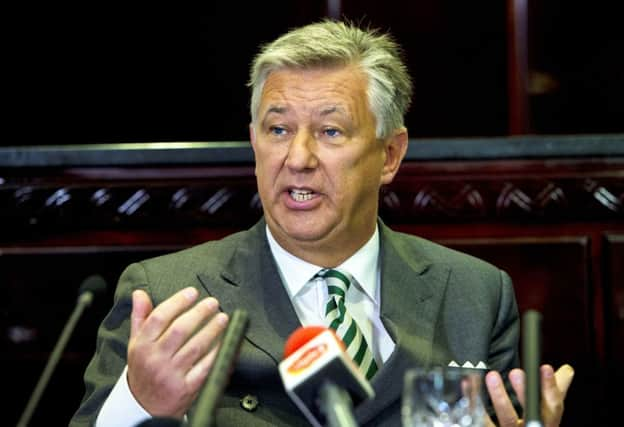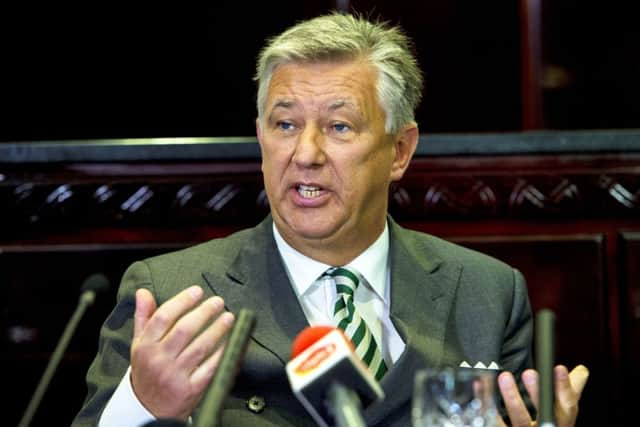Aidan Smith: Is the current SPFL deal worth it?


Cup quarter-final day used to be one of the best in the football calendar. The early rounds are almost too clamorous, the semi-finals too exclusive, but eight clubs remaining is more involving in every sense. You’ve done well to get this far; you’re a definite contender. The Scottish Cup and the FA Cup don’t always reach this stage at the same moment but they did on Saturday, or rather they didn’t. Not one tie was played at 3pm that day when it used to be that all of them did.
Nostalgists for the classic kick-off – Saturday, 3pm, always and forever – have been told for long enough that they’re wasting their time hoping it will make a comeback because TV rules now and football has to shunt around to accommodate the latter stages of The Voice and the revival of Poldark.
Advertisement
Hide AdAdvertisement
Hide AdBut the perils of the game laying itself open to the whims of the broadcasters were exposed at the weekend. Scotland at least intended to have a tie start at 3pm but the Inverness Caley Thistle pitch was waterlogged. With the other ties happening at TV’s convenience on Friday night and Sunday lunchtime – which of course inconvenienced away fans – the impact the quarter-finals should have had was diluted, even though Dundee United and Celtic tried their darnedest to pack their match with as much blood and thunder as possible.


In England meanwhile, they gave up the 3pm slot completely, stretching out the ties even further, squeezing as much as they could from what used to be called the romance of the cup, only to end up with images from the same bygone age. But these were the nasty ones of pitch invasions, fans squaring up to players, linesmen fleeing. And guess what? TV was screening the match live, so impressionable boys could get a pre-watershed glimpse of how dangerous football used to be. The beautiful game continues to reap what it sows.
Here was a match, everyone said afterwards, which needed the traditional, and hopefully calming, certainties of three o’clock on a Saturday afternoon. It did not need a 5.30pm kick-off – at TV’s behest – so that supporters could spend all day in the pub, stoking up loathing for their fellow West Midlanders.
Scotland’s problem is not England’s – that of too many fans on the pitch – it’s the one of there being not enough spectators in the ground to start a rammy over cold pies. Peter Lawwell, the Celtic chief executive, called for Scottish football to revert to 3pm on Saturdays before the Saturday just gone could offer up no cup magic anywhere at the once-sacred hour, so his argument will have been boosted by the rain in Inverness and the fact it was raining ripped-up seats, bottles, coins and abuse in Birmingham.
Lawwell says the TV payout in Scotland is so modest he’d rather forget about it and have Celtic play at the time they did every week without fail in Jock Stein’s day. The club would attract bigger crowds and this, together with other match-day revenues, would mean they wouldn’t miss the £2 million they currently receive from the broadcasting deal.
Well, something has to be done about the lack of atmosphere at Celtic Park where if you rustle your Soor Plooms too vigorously you risk a steward telling you to quieten down. Unfortunately our other clubs are much more dependent on the cash from TV. Motherwell, Kilmarnock and the rest can’t afford to turn their backs on it.
Lawwell’s intervention is interesting. Is he really an out-and-proud advocate of Saturday at 3pm over and above anything else? Or, if the TV deal was greatly improved and demanded different start-times would he accept this? You suspect the latter. But the Scottish game needs more investment. But how can it win any more from TV when the grounds are empty and there’s a lack of competition? Sports accountant Charles Barnett looks beyond these issues and, unusually for someone in his position, talks almost emotively about football’s heritage in Scotland and how it’s under threat.
“Football’s administrators need to persuade the broadcasters that we have a product that is widely followed but may disappear or dissipate if sufficient funds are not put into the game in the near future,” says Barnett, a partner at the firm BDO LLP. He argues that for Scotland to be receiving only £15million when Sky and BT are prepared to pay £1.712billion for English football is “unfair and unsustainable”. Even another £20million or £30million – a “drop in the ocean” compared to the investment south of the border – would make a huge difference. “The hierarchy of Scottish football must start to lobby for more money,” he adds.
Advertisement
Hide AdAdvertisement
Hide AdThe return of Rangers to the top-flight will obviously be attractive to TV but, increasingly and not just for reasons of nostalgia, the comeback we really crave is that of the classic kick-off. It’s as reassuring as the message at the end of the old Batman series: “Same Bat-time, same Bat-channel.” And it may take the superhero himself to bring it about.
FOLLOW US
SCOTSMAN TABLET AND MOBILE APPS